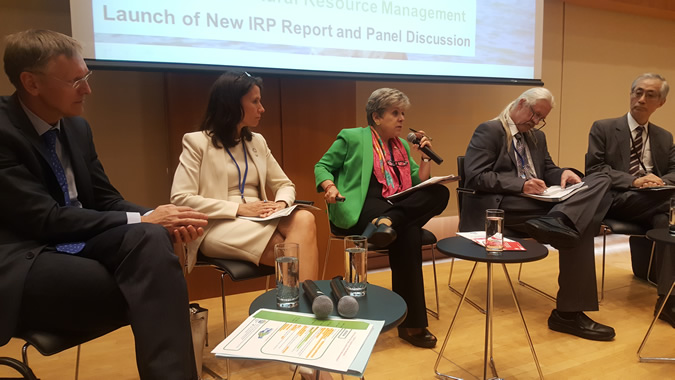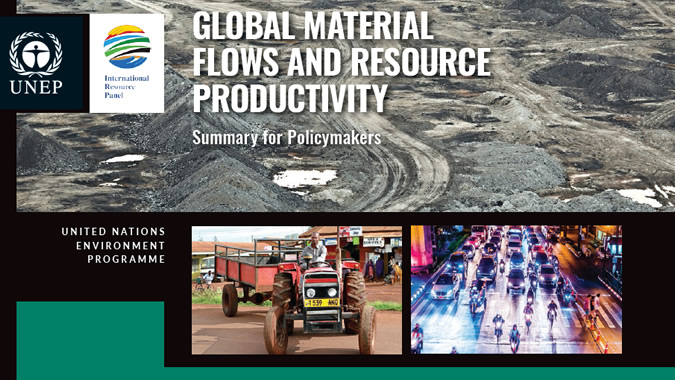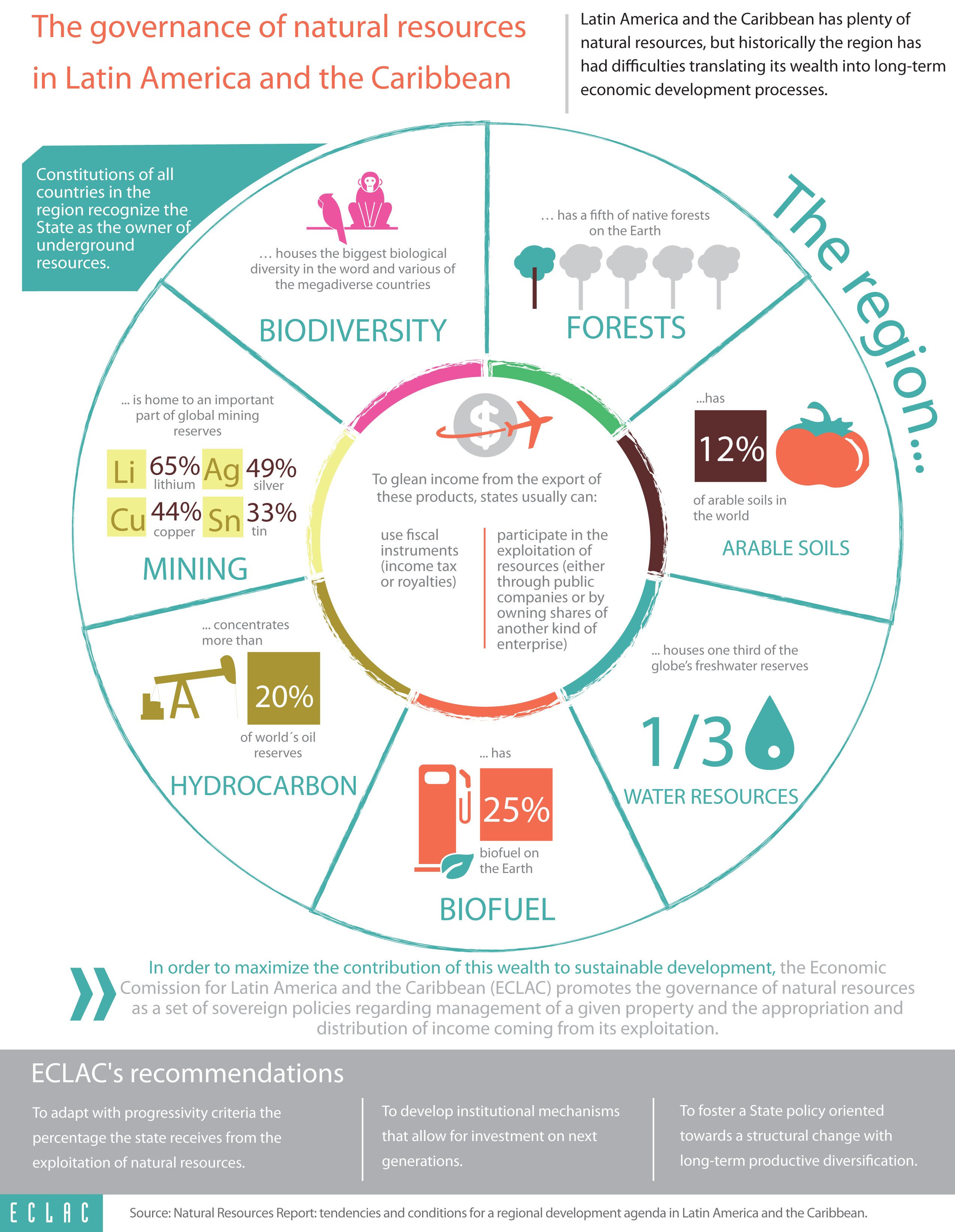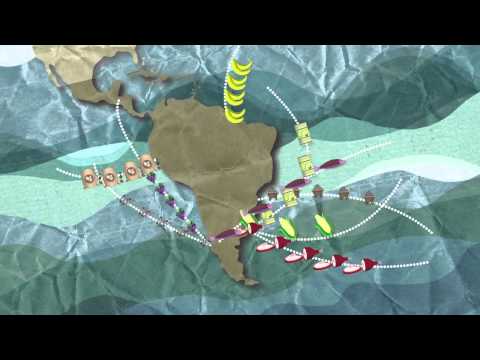ECLAC: A New Governance of Natural Resources is Needed for Compliance with the 2030 Agenda
The organization’s Executive Secretary, Alicia Bárcena, presented in New York an initiative to create a Regional Centre for Governance of Natural Resources in Latin America and the Caribbean.

“Greater and better governance of natural resources is necessary to fulfill the goals of sustainable development. This necessitates moving towards greater efficiency in the use of material resources, particularly non-renewable natural resources,” ECLAC’s Executive Secretary, Alicia Bárcena, said today during a side event to the High-level Political Forum on Sustainable Development, which is taking place in New York.
The senior United Nations official headed the meeting entitled “How to Leave No One Behind: Sustainable Natural Resource Management,” which was organized by the International Resource Panel (IRP), an entity made up of prominent scientists and experts on natural resources in which Bárcena serves as Co-Chair, and which is part of the United Nations Environment Programme (UNEP).
At the gathering participants included Reinhard Krapp, Minister and Head of the Economic Department of the Permanent Mission of Germany to the United Nations; Janez Potocnik, Co-Chair of the International Resource Panel and former EU Environment Commissioner; Elliot Harris, Assistant Secretary-General of the United Nations and Director of the UNEP New York Office; Rita Schwarzelühr-Sutter, Parliamentary State Secretary of the German Federal Ministry for the Environment, Nature Conservation, Building and Nuclear Safety; Alfred James Wills, Deputy Director General at South Africa’s Department of Environmental Affairs; and Hironori Hamanaka, Professor and Chair of the Board of Directors of the Institute for Global Environmental Strategies (IGES) in Japan.
“The current patterns of production and consumption are unsustainable. The use of resources must be decoupled from growth and these patterns must be changed,” stressed Alicia Bárcena, adding that industrialized countries with more mastery of technology should create incentives and lead the transition towards that decoupling. She also insisted that both public and private investment and technology portfolios are needed.
Bárcena said that the exploitation of natural resources and the associated emissions and waste have accelerated in the last decade. “For that reason we must reorient the governance of natural resources extraction with the goal of maximizing its contribution to sustainable development at all levels and complying with the 2030 Agenda’s Sustainable Development Goals (SDGs). They depend on the governance of natural resources,” she said.
This governance entails regulating ownership, the forms of appropriation and the distribution of the profits reaped from natural resources, so that society as a whole can benefit from their exploitation.
Bárcena stated that the recent “supercycle” of increased commodities prices, which lasted for 15 years, has come to an end. “Analyzing price trends can help improve macroeconomic policies and, therefore, this is a key element for the new governance of natural resources,” she indicated.
In this vein, ECLAC’s Executive Secretary proposed the creation of the Regional Centre for Governance of Natural Resources in Latin America and the Caribbean, which could serve as a regional platform (the only one of its kind under the auspices of the United Nations) to coordinate, analyze and lead discussions and dissemination activities on these matters, while also providing technical assistance to member countries.
In her speech, Alicia Bárcena also referred to the role of megacities in the region and the need to move towards sustainable urbanization. She emphasized that “the city must be seen as a priority objective in the strategy for progressive structural change.” She recalled that more than 80% of the population of Latin America and the Caribbean lives in cities, making the region the most urbanized in the world. The opportunities and challenges posed by these issues will be addressed during the Third United Nations Conference on Housing and Sustainable Urban Development (Habitat III), which will be held in October in Quito, Ecuador.
During the event, the IRP unveiled an advance copy of its report Global Material Flows and Resource Productivity, which will be officially launched tomorrow, Wednesday, July 20, in New York. The report presents various ways in which the world can maintain economic growth and increase human development, while also reducing the amount of primary materials that it uses to achieve this.
Related content

Worldwide Extraction of Materials Triples in Four Decades, Intensifying Climate Change and Air Pollution
Richest countries consume on average 10 times as many materials as world’s poorest, according to a new report by the United Nations Environment Programme-hosted International Resource Panel (IRP).

The governance of natural resources in Latin America and the Caribbean
Latin America and the Caribbean has plenty of natural resources, but historically the region has had di culties translating its wealth into long-term economic development processes.

Subregional headquarter(s) and office(s)
Related link(s)
Country(ies)
- Latin America and the Caribbean
Related project(s)
Contact
Public Information Unit
- prensa@cepal.org
- (56 2) 2210 2040
